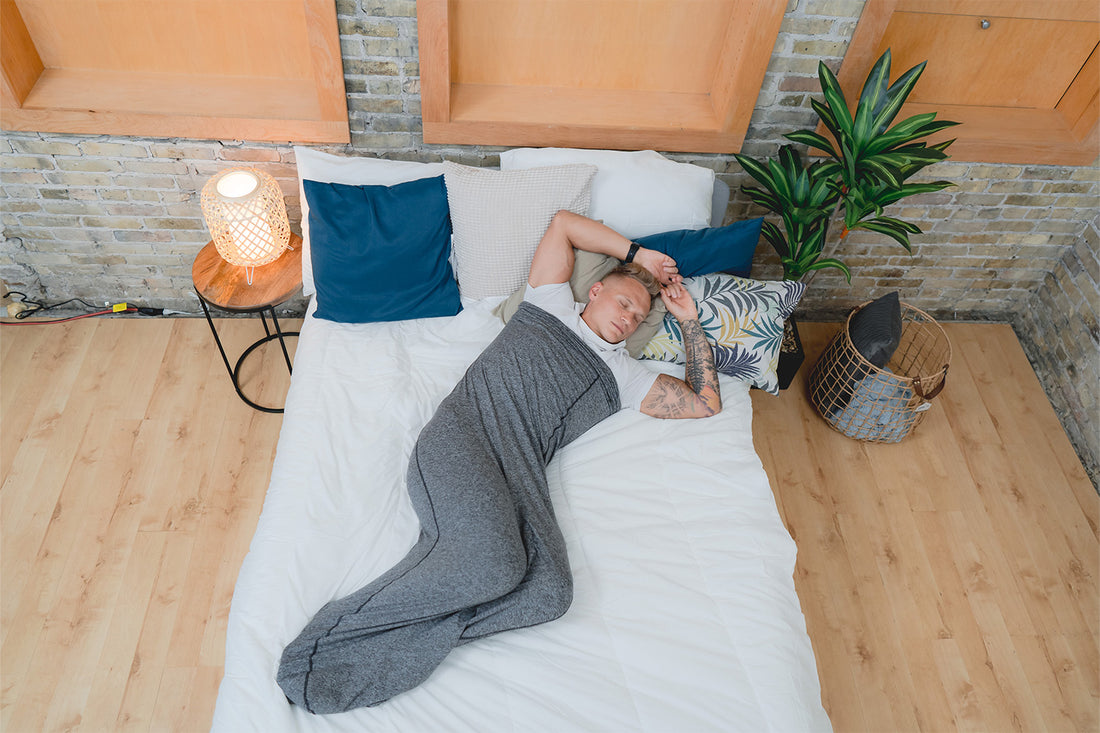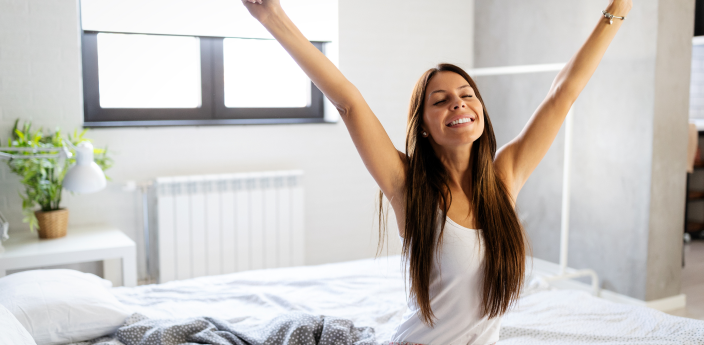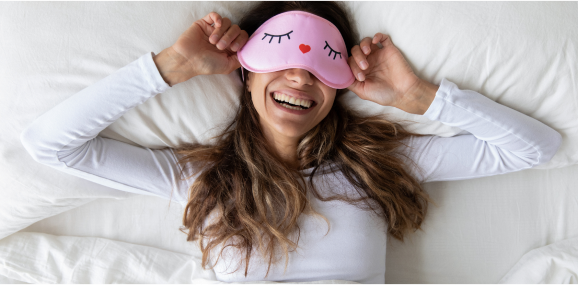We’ve all had moments when we set our alarm clocks with every intention of waking up as soon as it summons us in the morning — only to smash the snooze button.
The alarm clock tells us it’s time to get up, but our internal clock tells us five more minutes, sometimes more. Our sleep cycle is off and is in need of repair.
Your body clock can get thrown out of whack for a variety of reasons, from bad sleep hygiene and habits, to midterms, sleep disorders, electronic devices, or jet lag.
Thankfully, there are some ways to help you fix a disrupted sleep schedule.
Understanding Your Internal Clock
Whether you realize it or not, our bodies are equipped with their own clock — a biological clock. This internal clock is made up of circadian rhythms. These rhythms refer to the mental, physical, and behavioral changes that follow a 24-hour cycle to help us maintain a consistent sleep schedule.
In effect, these circadian rhythms are always running in the background, helping our bodies carry out all the necessary biological functions that help keep us going. They give us cues on when to eat and when to sleep.
The Importance of the Sleep-Wake Cycle
The sleep-wake cycle is integral to a good night’s sleep. Many of the circadian rhythms are directly influenced by processes in the brain, but not the sleep-wake cycle.
The master clock of the sleep-wake cycle is found in the environment. It is directly influenced by environmental cues, namely, light. This is why this particular circadian rhythm is tied to the 24-hour cycle of day and night.
Our internal clock is controlled by an area in the brain known as the suprachiasmatic nucleus (SCN), which is located in the hypothalamus. It is the SCN that is sensitive to the influences of light and dark and is responsible for hormone release.
During the day, exposure to light causes signals to be sent throughout our body that promote alertness and help keep us active — and awake.
At night time, when darkness closes in, the SCN triggers the pineal gland to produce melatonin. It is this hormone that helps us feel sleepy and gets us relaxed for bed.
If this sleep-wake cycle gets thrown off due to erratic sleep schedules our overall quality of sleep and sleep health is affected.
Disruptions in Our Sleep Schedule
Disruptions in our sleep schedule and sleep-wake cycle can occur for a variety of reasons.
For example, pulling all-nighters while trying to cram for a mid-term can definitely do the trick. Nighttime feedings for a new baby at home can also throw you off of your sleep schedule.
Here are some other potential causes that can throw our sleep schedule out of whack:
- Jet lag – If you are someone who travels a lot for work then you know the fatigue that comes from crossing different time zones. This jet lag can be a real determinant to a healthy sleep schedule.
- Shift work – Working night shifts can also disrupt your sleep schedule. This is especially true for those who do shift work, which requires them to work through the night. The sleep-wake cycle is thrown completely off.
Easy Ways To Fix Your Sleep Schedule
While some of these reasons are unavoidable, like traveling for work or working at night, disruptions in the sleep schedule can also be the result of poor sleep habits.
So, one of the first big steps in fixing your sleep schedule is establishing good sleep hygiene and a healthy bedtime routine.
Getting Enough Light During the Day
Resetting your sleep schedule requires bright mornings, literally.
Exposure to daytime light is one of the best ways to let your body know you are functioning on a normal sleep-wake cycle.
It also ensures your circadian rhyme processes are staying on pace.
For example, when you are exposed to light your body halts the production of melatonin, a sleep hormone. Light exposure is a primer for your body’s engine during the day, embrace it.
Keep the Nights Dark
On the flip side, it is equally as important to avoid exposure to light when it's getting close to bedtime, especially in your bedroom.
Creating a cool, dark bedroom environment is most conducive to good sleep, and blackout curtains or even an eye mask may be helpful.
This also includes avoiding screen time. Many people have a bad habit of overstimulating themselves with laptops or phones before bed (or in bed). Blue light from electronics can affect the circadian rhythm and disrupt your sleep-wake cycle.
Skip the Daytime Naps
This doesn’t apply to everyone. But to those who fancy a daytime nap, stop.
Seriously, daytime naps can easily throw your sleep schedule off and contribute to daytime sleepiness.
The reasons for this are pretty simple: Daytime naps make it difficult to sleep at night.
Plus, they rarely serve their purpose well. Long naps during the day tend to make us feel even more tired. If you must lay down, limit it to power naps — 20 minutes at the most and not after 3 p.m.
Get Some Daytime Exercise
Daily, daytime exercise is one of the best ways to help reset your internal clock. The reasons for this are straightforward: Physical exercise expels energy, and can even reduce your risk for heart disease and diabetes.
Not only that, it helps release endorphins, chemicals that help relieve stress, and leaves you feeling good. If you’re a beginner then start slow.
Aim for around 20 to 30 minutes of aerobic exercise per day.
This could be walking, jogging, or swimming. However, it is best to avoid exercise at least two to three hours before bed as it can cause overstimulation.
Eat Early and Avoid the Caffeine
Digestion takes a lot of work. If you wait too late to eat or you eat big meals before bed you might regret it later in the night. Your circadian rhythm is also tied to eating habits.
Simply put, a late-night, protein packed dinner could delay sleep and cause acid reflux, throwing everything off.
If you must eat late, keep it light and avoid high-fat and sugary meals.
Also, eliminate or limit caffeine after 2 to 3 p.m. As a stimulant, caffeine can stick around in the body for several hours. Though it affects everyone differently, it could pose issues come bedtime. This includes coffee, tea, sodas, and energy drinks.
Keep It Cool and Quiet
Your bedroom environment is important. It can also be one of the biggest roadblocks to optimal sleep. Sleep experts agree that temperature is one of the biggest factors for sleep quality.
While a cool bedroom is typically best, find a temperature on the thermostat that brings you the most comfort.
Also, limit the noise. A quiet sleeping environment can help get your sleep back on track. Try a fan, ear plugs, or a white noise machine to drown out distracting noises if they are an issue.
Manage Stress and Anxiety
Nothing disrupts sleep more than worry and stress. If you are constantly in a state of worry and anxiety don’t expect to sleep well. Stress promotes the production of cortisol; this hormone can make it harder to sleep.
But managing stress and anxiety looks different for everyone. For some, exercise does the trick, while others might prefer relaxation techniques like yoga, meditation, deep breathing, and more. Find what works for you, come up with a plan and stay consistent.
If you experience feelings of restlessness when it comes to falling asleep, the Sleep Pod might give you the relaxation you’re looking for.
Using gentle compression, it is designed with better sleep in mind and uses Deep Touch Pressure Stimulation to help bring you some calm.
The Bottom Line
Getting adequate sleep is imperative to our overall health and wellness. Sadly, that sleep can be disrupted by numerous factors, sometimes within our control, sometimes not.
Our biological internal clock helps keep the processes in our body going, the sleep-wake cycle in particular. Environmental factors, like light exposure, are very important to the process.
Unfortunately, things like jet lag, shift work, mid-terms, and poor sleep routines can throw off our normal sleep schedules, which could impact our health. Thankfully, there are ways to reset it.
Exposure to daytime light, exercise, and an optimal bedroom environment are just a few ways to help get your sleep schedule back on track.
Sources:
Light, melatonin and the sleep-wake cycle | NIH
Light and Sleep | Sleep Foundation

































500,000+ happy customers